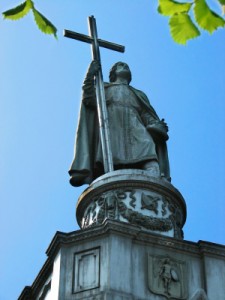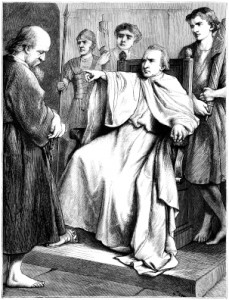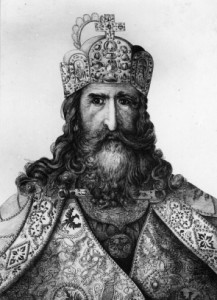
Vladimir Sviatoslavovich was born in 958 A.D. near Pskov, a city in Northwest Russia, about 12 miles east of the Estonian border. As the son of Sviatoslav I of Kiev, a warrior prince of Kieven Rus, Vladimir was the 10th century Rus equivalent of royalty. By the time Vladimir ascended to power he was a committed pagan, boasting multiple wives and eight hundred concubines. Yes, eight hundred, which probably makes him second only to Wilt Chamberlain.
Vladimir erected many pagan statues and shrines and in 983 A.D. , after a military victory, decided to show his gratitude to his pagan deity benefactors by way of a human sacrifice. A young Christian named Loann was chosen, and when Loann’s father Fyodor protested and preached Christianity to Vladimir and his army, the multitude was so incensed they rushed on Fyodor and killed him and Loann. Fyodor and Loann would later come to be considered the first Christian martyrs in Russia.
The whole incident with Fyodor and Loann left a lasting impression on Vladimir, who, whether driven by his guilty conscience, a desire for truth, or responding to the beckoning of the Holy Spirit we do not know, in 987 A.D. sent out representatives to those nations around him to inquire about their religions. They inquired of the Jews, Muslims and Catholics, but Vladimir was not inspired by what he found until his representatives returned from Constantinople and a visit to Hagia Sophia and reported the following:
“We knew not whether we were on heaven or earth. For on earth there is no such splendor or such beauty, and we are at a loss to describe it. We only know that God dwells there among men, and their service is fairer than the ceremonies of other nations. For we cannot forget that beauty.”
In 988 A.D., Vladimir converted to Christianity. He then began removing pagan monuments and building churches throughout his kingdom. Although there were Christians in Rus before Vladimir’s conversion, he is rightly credited with paving the way for the kingdom of God to take root in what would become Russia, and for that, the GOTK blog grants him the appellation of kingdom hero. GS



